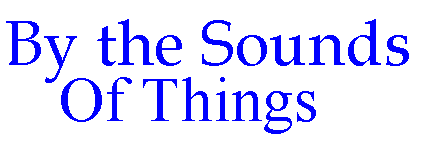I recently received the list of winners for a new music
competition and I was struck that all of the nine winning works had similar
titles.
Every composition had a title referring to a thing (or
things). All were nouns. Some were things in nature, such as echo, undercurrents, even bugs.
Others were things such as mirrors, points and flourishes.
Why are we enthralled with capturing, creating, and communicating sounds - about things?
I have a hard time relating to this trend to compose music based
on things. None of these composers explore the human condition, the inner
world, or explore our relationship to time. These works explore our environment
and the nature of THINGS.
As a conductor, I would also hesitate to put such music in front
of musicians. Asking musicians to dig deep in their soul and search the depth of their musicianship for cicadas seems rude.
What does this say about, well, the judges? The composers? Or
us – society?
I noticed, too, our recent “call for scores” for the NSO
brought in numerous works ‘painting scenery’ through music. Perhaps a work
about rain falling on Crater
Lake in the morning, or visual effects of light bouncing off distance mountains. A colleague confirmed that
“this is what they are teaching now days in universities.”
Does composing works based on the outer environment somehow
justify the use of quasi-tonal languages? Is this a back door of sorts for
academia to try to find a way back into the concert hall?
Mind you, I've always thought it rather odd, especially now days, to
title a work by its form - yet another thing.
Calling a piece ‘Symphony’ sounds about as exciting as writing a book and calling it “Novel No. 1.”
And now using labels referring to inanimate items in the
world. It doesn't appear that the works are about the sensations evoked by the thing, or our relationship to said mountain,
but rather, “this is what this thing is like in sound.”
Are we enthralled with “still life” compositions? “Fruit
bowl on wooden table for string quartet?” I hope this is only a passing phase.
I've written enough about how I approach composition, so
I’ll throw this out to readers to give me an earful.
Why are we utilizing the amazingly expressive tool box of music composition to present and engage listeners over THINGS?
